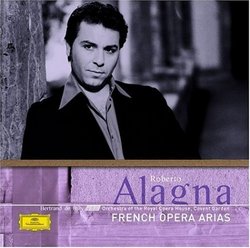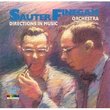| All Artists: Roberto Alagna Title: French Opera Arias Members Wishing: 0 Total Copies: 0 Label: Deutsche Grammophon Original Release Date: 1/1/2001 Re-Release Date: 7/4/2006 Genre: Classical Styles: Opera & Classical Vocal, Historical Periods, Classical (c.1770-1830), Romantic (c.1820-1910) Number of Discs: 1 SwapaCD Credits: 1 UPC: 028947762805 |
Search - Roberto Alagna :: French Opera Arias
 | Roberto Alagna French Opera Arias Genre: Classical
|
Larger Image |
CD DetailsSimilar CDs
|
CD ReviewsTenor here at his finest in diverse French program David H. Spence | Houston, TX | 07/21/2006 (4 out of 5 stars) "(The following originally posted 07.12.05 as a review of the same disc, as originally issued by EMI. Update on contents, notable shift in sound quality will follow, if necessary).
It frequently has seemed to me that French-Sicilian lyric tenor Roberto Alagna fares the best in the French repertoire, and least so in dramatic Italian repertoire. Nothing to contradict any of the above here, this makes for a most enticing program, a number of arias being from unfamiliar operas. Alagna has the greatest ease of course in the most lyrical excerpts chosen, for instance the insouciant charm of the opening aria from a light opera by Francois Bazin about a character naive in love, and including an easily reached top C-sharp right before the end. This is also the case with a charming aubade from what is usually a much heavier piece by Edouard Lalo, Le roi d'Ys (from which the overture survives in the concert repertoire), and Wilhelm Meister's romance from Thomas's Mignon, in which this older character (the age of which Alagna is subtle at catching) delights in how very charming his young daughter Mignon has become. He sings a brief romance by Gretry deftly enough and with charm, but the accompaniment for it is a bit anonymously modern sounding here. It is cleverly placed in this program right before the Halevy discussed below, for their tuneful similarities at outset of each. Equally sublime, if slightly darker, is Pylades' appeal to Oreste from Gluck's Iphigenie en Auride, the prospect of dying together as friends with him in upcoming fighting. Following the model of Gluck and without being as stark in contrast as, for example "Inutiles regrets" from Les Troyens (not included here and a voice killer for a lyric voice), but anticipating Berlioz in psychological contrast and irregular phrase rhythms and shaping, is an aria from Etienne-Nicolas Mehul's opera, Joseph, in which Joseph calls on his brothers to repent and make peace with him, even as flattered as he is under the patronizing tutelage of Pharaoh. These two arias are probably worth the price of admission alone, as expressively and specifically Alagna makes the case for both. "Rachel, quand du Seigneur" from Halevy's La Juive is also a highlight of this recital, and like in the Thomas above, Alagna sings with a little darker color, giving his character here the right sense of gravitas and sorrow along these lines, without ever in this aria excessively pushing his limits. A long phrase that takes Alagna to a high B-Flat and down to an E-Flat over an octave below has a color to it, during which he does not take more than one staggered breath, that may so briefly remind fans of historical vocal recordings, of the Corsican tenor Cesar Vezzani, along with perhaps one other place or two elsewhere on this recital. An aria that expresses equally great pain of regret, but for a character not in quite the same predicament, is a warrior's aria by Cherubini, the hero in which who has just won a battle, but failed to recover his country's flag, thus also losing the girl he loves. One finds Alagna, sounding petulant at turns during it, close to being equally expressive here. Heavier pieces on this program fare less well, but Alagna mostly remains judicious in how he chooses to make his way through each of them. And yet he still he has to bench press, loses intonation here and there, and runs the risk of curdling the quality of his sound at the break and above. He has a little easier time somehow with the long prison aria for Samson in Saint-Saens' opera than with the aria from Le Cid, but he still sings even that with connected line and good tastes, all the same. The dark Invocation to Nature from Berlioz's Damnation of Faust finds Alagna coasting to get through this vocally most awkward, yet brief, emotionally intense moment. The placing of the orchestra on this piece is a bit recessed, and for fear of strain to Alagna's voice, they do little to abet his shaping of it, as much as they could at least with a more dramatic voice. Of more exotic appeal is the so familiar aria from Meyerbeer's L'Africaine, in which Alagna is facile in catching the explorer's sense of wonder and ambition in a new land. Alagna tends to croon some of the equally familiar aria from Bizet's Pearl Fishers, and whereas being well in character, loses intonation a little at the close to it. Of equally sensuous appeal are arias from Gounod's Mireille (also on Rolando Villazon's recent Massenet/Gounod album), "Anges du paradis", and from L'attaque du moulin by Massenet protege and Emile Zola friend and admirer Alfred Bruneau. Both serve as potential object lessons to the competing tenor in how to sing the first number lightly, with an exquisitely tapered off ascent to a G-sharp in the former, and to find greater simplicity in singing music in the same idiom, the Bruneau, as the two closing Massenet numbers on Villazon's album. Alagna, following the lament from Samson et Dalila, closes very nicely with the Bruneau aria, and with sufficient heroic stance, without unduly stretching his limits. Accompaniments by Bertrand de Billy and the Royal Opera House orchestra (with a few moments of recessed chorus only in the Saint-Saens) are mostly skillful, musical, without being clearly specific and well contrasted to each musical idiom from different periods of French opera as one might desire. This is altogether a most enjoyable album, however, for at least sake of the discovery of cruelly neglected repertoire, all of for which Alagna makes the case most persuasively. " |

 Track Listings (15) - Disc #1
Track Listings (15) - Disc #1

